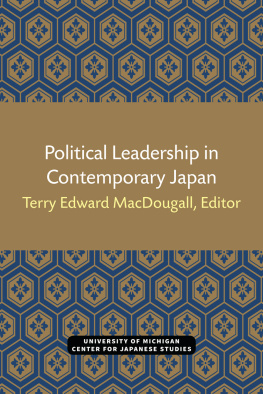Terry Edward MacDougall - Political Leadership in Contemporary Japan
Here you can read online Terry Edward MacDougall - Political Leadership in Contemporary Japan full text of the book (entire story) in english for free. Download pdf and epub, get meaning, cover and reviews about this ebook. year: 2020, publisher: University of Michigan Center for Japanese Studies, genre: Politics. Description of the work, (preface) as well as reviews are available. Best literature library LitArk.com created for fans of good reading and offers a wide selection of genres:
Romance novel
Science fiction
Adventure
Detective
Science
History
Home and family
Prose
Art
Politics
Computer
Non-fiction
Religion
Business
Children
Humor
Choose a favorite category and find really read worthwhile books. Enjoy immersion in the world of imagination, feel the emotions of the characters or learn something new for yourself, make an fascinating discovery.
- Book:Political Leadership in Contemporary Japan
- Author:
- Publisher:University of Michigan Center for Japanese Studies
- Genre:
- Year:2020
- Rating:3 / 5
- Favourites:Add to favourites
- Your mark:
- 60
- 1
- 2
- 3
- 4
- 5
Political Leadership in Contemporary Japan: summary, description and annotation
We offer to read an annotation, description, summary or preface (depends on what the author of the book "Political Leadership in Contemporary Japan" wrote himself). If you haven't found the necessary information about the book — write in the comments, we will try to find it.
Political Leadership in Contemporary Japan — read online for free the complete book (whole text) full work
Below is the text of the book, divided by pages. System saving the place of the last page read, allows you to conveniently read the book "Political Leadership in Contemporary Japan" online for free, without having to search again every time where you left off. Put a bookmark, and you can go to the page where you finished reading at any time.
Font size:
Interval:
Bookmark:

THE UNIVERSITY OF MICHIGAN CENTER FOR JAPANESE STUDIES
MICHIGAN PAPERS IN JAPANESE STUDIES
NO. 1
POLITICAL LEADERSHIP IN CONTEMPORARY JAPAN
edited by
Terry Edward MacDougall
Ann Arbor
Center for Japanese Studies
The University of Michigan
1982
ISBN 0-939512-06-8
Copyright 1982
by
Center for Japanese Studies
The University of Michigan
Library of Congress Cataloging in Publication Data
Political leadership in contemporary Japan.
(Michigan papers in Japanese studies; no. 1)
Includes bibliographies.
1. Political partiesJapan. 2. PoliticiansJapan. 3. Leadership. 4. JapanPolitics and government1945-. I. MacDougall, Terry Edward, 1941-. II. University of Michigan. Center for Japanese Studies. III. Series.
JQ1698.A1P64 1982 324.252 82-9634
ISBN 0-939512-06-8
Printed in the United States of America
ISBN 978-0-93-951206-5 (paper)
ISBN 978-0-47-212803-7 (ebook)
ISBN 978-0-47-290198-2 (open access)
TABLE OF CONTENTS
Terry Edward MacDougall
Kent E. Calder
Susan J. Pharr
Terry Edward MacDougall
Ellis S. Krauss
Ronald Aqua
Richard J. Samuels
Those who do not read Japanese seldom have access to analytic studies of the fascinating and surprisingly diverse world of contemporary Japanese political leadership. This little volume hardly fills that gap, but it does constitute a step toward bringing to the English reader some sense of the norms, beliefs, styles, and modes of exercising power of Japanese political leaders and the organizational and political contexts which are changing leadership role expectations. A second volume in this series concentrates more explicitly on leadership recruitment, although the subject is also addressed here.
All of the essays in this volume highlight specific politicians, while attempting to develop analytic categories to understand the broader significance of these types of leaders. Included are the following: a Liberal Democratic Party prime minister and faction leader (Fukuda Takeo) who rose almost effortlessly to the pinnacle of power on the basis of an elitist educational and bureaucratic career background and another (Tanaka Kakuei) who took advantage of the chaotic wartime and immediate postwar period to overcome the limitations of his commoner background by developing an entrepreneurial style that makes him even today the most powerful man in Japan; a younger conservative leader (Kno Yhei) who, with certain others of his generation, found life within the restrictive but predictable career paths of the ruling Liberal Democrats less attractive than the risky option of forming his own New Liberal Club; an unconventional Socialist chairman (Asukata Ichio) who bucks the pull toward coalition making among the opposition parties in favor of his belief that this major but perpetual opposition party must first reconstruct itself and structure a new popular consensus that can legitimize a coalitional alternative to the Liberal Democrats; parliamentary leaders (like lower-house speaker Maeo Shigesabur, directors of the House Management Committee, and heads of the Diet policy committees of the various parties) who are projected into increasingly influential roles by changing electorial trends and popular expectations; an innovative and dynamic mayor (Suzuki Heizabur) who, taking advantage of the considerable authority afforded by Japans presidential system of local chief executives, pursues his own priorities, mobilizing the requisite support despite the lack of national guidance and the 1 opposition of former backers; and the power behind the throne (Matsunaga Yasuzaemon and Komori Takeshi) whose visions move prime ministers and governors as well as their own followers in powerful public and private bureaucracies.
Kent Calder, through a systematic comparison of former prime ministers Fukuda Takeo and Tanaka Kakuei, contrasts two predominant types of postwar, conservative political leaders, the kanry (bureaucrat) and the shomin (commoner). Both are political brokers (persons providing private-sector groups and individuals special access to direct material benefits or regulatory actions dispensed by official bureaucracy) rather than originators or legitimizers of policy. Calder stresses that the high frequency of political brokers among Japanese conservative leaders is facilitated not simply by a cultural predilection to make decisions outside public view, where conflicts are more easily mediated, but also by the character of one-party dominance during an era of rapid economic growth, which created abundant resources to broker for a demanding public.
Contrasting Fukuda and Tanaka (the archetypical kanry and shomin, respectively), Calder demonstrates why the former high-level bureaucrat turned conservative politician has had a relatively easier task playing the political broker role; his prestigeous educational background (Tokyo Universitys Faculty of Law) and seniority within officialdom provide him with easy access to the ministries and abundant opportunities to influence the career chances of rising bureaucrats, who are themselves in a strong position to allocate credit, licenses, regulatory decisions, and other resources desired by the private sector. By contrast, the shomin, if he is to be a successful political broker, must be more entrepreneurial in style, creating resources (like new postcareer jobs or party nominations for ex-bureaucrats and special credit facilities for private groups) to construct his institutional ties to the establishment and develop private clienteles.
The prevalence of political brokers at the helm of the ruling Liberal Democrats, Calder suggests, has had a telling impact on the countrys political economy, giving it an expansionary thrust and complicating bureaucratic control. But, in turn, the slower rates of economic growth following disturbances in the international economic system in the 1970s may impell a new content to conservative brokerage. Brokers in an era of scarcity may have to appeal to such nonacquisitive sentiments as nationalism or a desire for a just society. Importantly, this transition to a new, not yet clearly defined, conservative style of leadership coincides with the impending rise of a new generation of conservative leaders.
Susan Pharrs essay focuses on the question of status conflict inherent in the clear demarcation of political generation and hierarchically defined allocation of rewards within Japanese conservative political circles. Noting that within the Liberal Democratic Party political age (numbers of times elected to the National Diet) and biological age largely determine the status hierarchy, which may be adjusted but not restructured by performance criteria, Pharr delineates the enormous resources (government, parliamentary and party posts, election nominations and campaign funds, policy choices, etc.) in the hands of Liberal Democratic power brokers (largely, former prime ministers and heads of factions). Followers from seceding generations have little recourse but patiently to learn the rules of the game as they await the calling of their numbers for higher and higher levels of power and authority. The inequality inherent in this hierarchical arrangement of power, which permeates all sorts of Japanese organizations, has been made more salient and difficult for younger generations to bear as postwar equalitarian values become more firmly internalized. Yet a fundamental dilemma remains for the party and Japanese society, since few channels exist for working out such status-based conflicts.
Pharr documents the convoluted process by which such an intergenerational conflict within the Liberal Democratic Party led Kno Yhei and several others of junior rank to bolt the party in 1976 to form the New Liberal Club. Meticuluously tracing five analytically distinguishable stages of conflict behavior, she identifies the origin of the conflict, the declining incentives of young (as opposed to middle-level or older) conservatives to abide by traditional hierarchy, and why this particular group rather than some other had the wherewithal to expect something better outside the governing party. Before reaching that final stage, however, she shows how the very hierarchical structure of power shaped the only possible hope for renegotiating the terms of status within the partyby seeking the mediation of a middle generation of conservative leaders, some of them impatient for top leadership themselves.
Font size:
Interval:
Bookmark:
Similar books «Political Leadership in Contemporary Japan»
Look at similar books to Political Leadership in Contemporary Japan. We have selected literature similar in name and meaning in the hope of providing readers with more options to find new, interesting, not yet read works.
Discussion, reviews of the book Political Leadership in Contemporary Japan and just readers' own opinions. Leave your comments, write what you think about the work, its meaning or the main characters. Specify what exactly you liked and what you didn't like, and why you think so.










